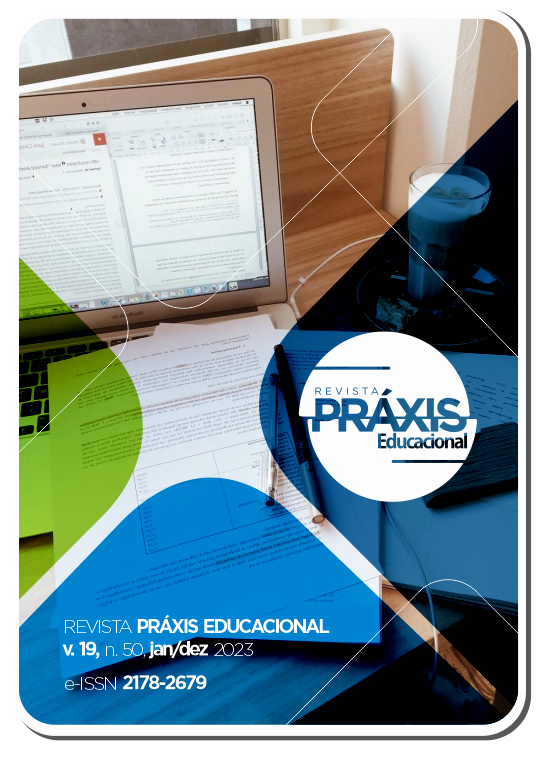Curricularization of university extension in the context of the social function of the university
DOI:
https://doi.org/10.22481/praxisedu.v19i50.11534Keywords:
curricularization, university education, university extensionAbstract
This article proposes to discuss the role of the curricularization of University Extension as a process aimed at the search for transformation of the ways of understanding and designing actions in the scope of academic-scientific doing, increasing the reflection on the construction and socialization of scientific knowledge and technological, in view of its implications in the context of social relations. For the methodological design of the study, an extensive bibliographic survey and document analysis on the subject are used, discussing the concept of curricularization and its implications for the consolidation of the university beyond its operational vision. This requires the effective recognition of the constitutional principle of inseparability between teaching, research and university extension, activities mediated by management and, mainly, for the transformation of curricular paradigms still strongly marked by the perspective of instrumentalization for the labor market, not disregarding the appeal social and political aspect of this trend. The results reflect the understanding that a social institution such as the university, in addition to the construction and socialization of knowledge, interferes in the system of social relations, contributing to the transformation of ways of seeing, understanding and producing visions of the world, projecting new ways of acting policy. In the midst of this sociocultural construct, the university needs to develop practices aimed at public recognition of its legitimacy and attributions, elements that justify the process of curricularization of university extension.
Downloads
Metrics
References
BRASIL. República Federativa. Lei 13.005 de 25 de junho de 2014. Aprova o Plano Nacional de Educação – PNE e dá outras providências. Brasília, Gabinete da Presidência da República, 2014. Disponível em: https://www2.camara.leg.br/legin/fed/lei/2014/lei-13005-25-junho-2014-778970-publicacaooriginal-144468-pl.html. Acesso em: 27 out. 2022.
BRASIL. República Federativa. Ministério da Educação. Conselho Nacional de Educação. Câmara de Educação Superior. Resolução nº 7, de 18 de dezembro de 2018. Estabelece as Diretrizes para a Extensão na Educação Superior e regimenta o disposto na meta 12.7 da Lei 13.005/2014, que aprova o Plano Nacional de Educação – PNE 2014-2024 e dá outras providências. Diário Oficial da União, Brasília, 19 de dezembro de 2018, Seção 1, p. 49 - 50.
BRANDÃO, Carlos Rodrigues. A educação como cultura. 2. ed. São Paulo: Brasiliense, 1986, 198 p.
DAVIDOV, Vasily Vasilievich. Conteúdo e estrutura da atividade de estudo. In: Teoria da Atividade de Estudo: contribuições de D. B. Elkonin, Vasily V. Davidov e V. V. Repkin – Livro I. 1. ed. Curitiba: CRV, Uberlândia: EDUFU, 2019, 438 p.
FORPROEX - Fórum de Pró-Reitores das Instituições Públicas de Educação Superior Brasileiras. Política Nacional de Extensão Universitária. Manaus (AM): FORPROEX, 2012. Disponível em: https://portal.ifba.edu.br/feira-de-santana/pesquisa-extensao-e-estagio/coordenacao/politica-nacional-de-extensao-universitaria-forproex.pdf. Acesso em: 22 out. 2022.
GARCIA, Adir Valdemar; HILLESHEIM, Jaime. Pobreza e desigualdades educacionais: uma análise com base nos Planos Nacionais de Educação e nos Planos Plurianuais Federais. Educar em Revista, Curitiba, Brasil, Edição Especial n. 2, p. 131-147, set. 2017. Disponível em: https://www.scielo.br/j/er/a/s4Z4xXszc389JhTJKvr7kXv/?format=pdf&lang=pt. Acesso em: 24 out. 2022.
GOHN, Maria da Glória. Movimentos sociais e educação. 8. Ed. São Paulo, Cortez, 2012, 128 p.
LIBÂNEO. José Carlos. A didática e a aprendizagem do pensar e do aprender: a teoria histórico-cultural da atividade e a contribuição de Vasili Davydov. Artigos. Rev. Bras. Educ. (27). Dez 2004. Disponível em: https://www.scielo.br/j/rbedu/a/ZMN47bVm3XNDsJKyJvVqttx/?format=pdf&lang=pt. Acesso em: 18 out. 2022.
MOREIRA, Antonio Flavio Barbosa; TADEU, Tomaz. Sociologia e teoria crítica do currículo: uma introdução. In: MOREIRA, Antonio Flavio Barbosa; TADEU, Tomaz. Currículo, Cultura e Sociedade. 12. ed. São Paulo: Cortez, 2013, p. 13-47.
OLIVEIRA, Natália Fraga Carvalhais; MELO, Savana Diniz Gomes. A relação entre a universidade e as políticas de ampliação da jornada escolar. Educação em Revista, v.34, e181620, p. 1-29, Belo Horizonte (MG), 2018. Disponível em: https://www.scielo.br/j/edur/a/BfMpxjppZgBXz4Hj39nFtDH/?format=pdf. Acesso em: 14 set. 2022.
ORGANIZAÇÃO DAS NAÇÕES UNIDAS (ONU). Agenda 2030 para o Desenvolvimento Sustentável. Disponível em: https://brasil.un.org/pt-br/91863-agenda-2030-para-o-desenvolvimento-sustentavel. Acesso em: 25 out. 2022.
PICHETH, Sara Fernandes; CASSANDRE, Marcio Pascoal; THIOLLENT, Michel Jean Marie. Analisando a pesquisa-ação à luz dos princípios intervencionistas: um olhar comparativo. Educação, Porto Alegre, v. 39, n. esp. (supl.), p. 1-12, dez. 2016. Disponível em: https://revistaseletronicas.pucrs.br/index.php/faced/article/view/24263/15415. Acesso em: 12 set. 2022.
PORTO GONÇALVES, Carlos Walter. Para além da crise de paradigmas: a ciência e seu contexto. Universidade e Sociedade, Ano XXI, vol. 21, n. 49, p. 10-23, Brasília, 2012.
SANTOS, Boaventura de Sousa O Fim do Império Cognitivo: a afirmação das epistemologias do Sul. 1. ed. Belo Horizonte: Autêntica, 2019, 478p.
SOUSA, Ana Luisa Lima. A História da Extensão Universitária. 1. ed. Campinas-SP: Editora Alínea, 2000, 138 p.
THIOLLENT, Michel Jean Marie. Construção do conhecimento e metodologia da extensão. Cronos, Natal-RN, v. 3, n. 2, jul./dez. 2002. Disponível em: https://periodicos.ufrn.br/cronos/article/view/15654/10730. Acesso em: 11 set. 2022.
Downloads
Published
How to Cite
Issue
Section
License
Copyright (c) 2023 Práxis Educacional

This work is licensed under a Creative Commons Attribution-ShareAlike 4.0 International License.
You are free to:
Share - copy and redistribute the material in any medium or format; Adapt - remix, transform, and build from the material for any purpose, even commercially. This license is acceptable for Free Cultural Works. The licensor cannot revoke these freedoms as long as you follow the terms of the license.
Under the following terms:
Attribution - You must appropriately give credit, provide a link to the license, and indicate if any changes have been made. You may do so in any reasonable way, but not in a way that suggests that you or your use is endorsed by the licensor.
There are no additional restrictions - You cannot apply legal terms or technological measures that legally restrict others to make any use permitted by the license.










